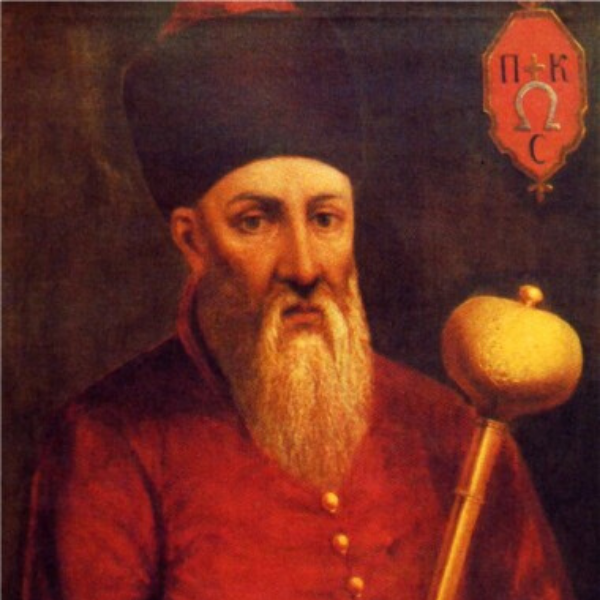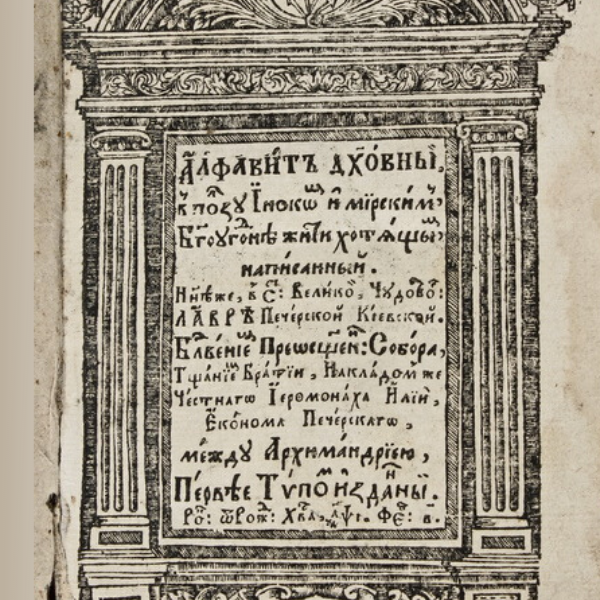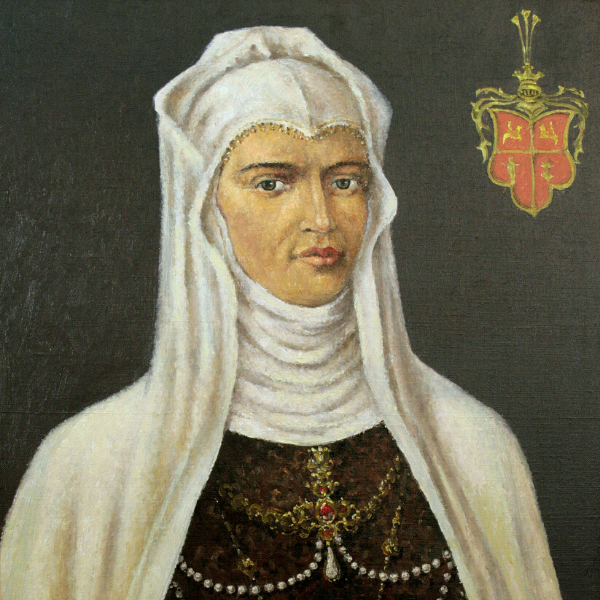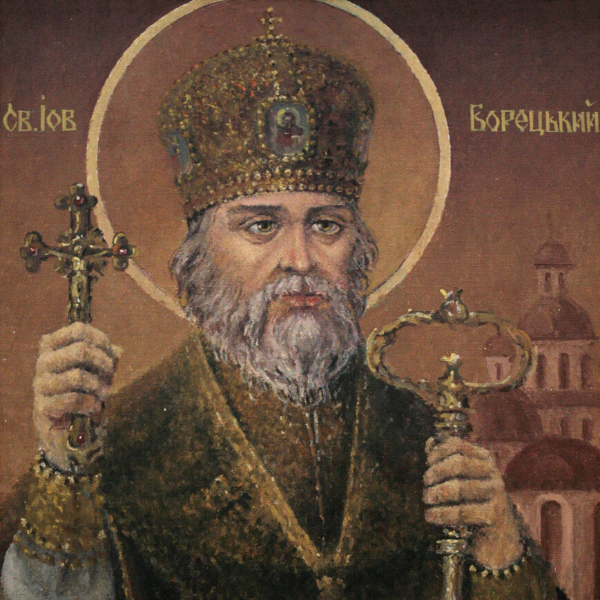(archive)
Petro Sahaidachnyi

Konashevych, Sahaidachnyi Petro Kononovych, from the coat of arms of Pobuh (about 1570, 1577 or 1578, Kulchytsi village, Sambir district of Rus Voivodship, today Sambir district of Lviv oblast — 10 Apr 1622, Kyiv) — military leader, political figure, Hetman of the Zaporizhian Army, one of the founders of Kyiv Brotherhood and Kyiv Brotherhood School, its patron and philanthropist.
He came from the noble Orthodox ancestry of Konashevych-Popel. It is likely that future Hetman was nicknamed Sahaidachnyi in Sich. In 1592-1598 he studied at Ostroh School, after which he moved to Kyiv. In the end of the 1590s, he joined the Zaporizhian Army. In 1616 he was elected Hetman of the Zaporizhian Army and held a series of successful military campaigns while leading it.
In 1620 he was one of the initiators and organizers of the restoration of the Orthodox hierarchy of the Kyivan Metropolitanate, since after 1596 there was no Orthodox bishopric as a result of the Brest Union. The first ordination of the Orthodox hierarchs, including Job Boretsky, Isaiah Kopynsky, Meletiy Smotrytskyi, and others, was secretly held in October 1620 in the Epiphany Church of Kyiv Bratsky Monastery under the protection of the Cossack army.
The consecration was conducted by Patriarch of Jerusalem Theophanes III who granted the patriarchal charter with the right to stavropigia to Kyiv Brotherhood, that is, the direct submission to the patriarch.
In 1620 P. Sahaidachnyi joined Kyiv Brotherhood with all the Zaporizhian Army, providing protection to the brotherhood, monastery, and school, and supporting them in the situation of the confessional rivalry.
In the middle of 1620, the first church of the Epiphany was built on the territory of Bratsky Monastery at the expense of Sahaidachnyi. According to Sahaidachnyi’s will, all his funds were granted to Kyiv, Lutsk, and Lviv Brotherhood Schools. P. Sahaidachnyi was buried in the Church of Kyiv Brotherhood Epiphany Monastery built by him, to which he commissioned a silver cross with gilding.
During the funeral, the students of Kyiv Brotherhood School read the poems dedicated to this event: Virshi na Zhalosnyi Pohreb Zatsnoho Rycera Petra Konashevycha Sahaidachnoho [Poems for the Mournful Funeral of the Honorable Knight Petro Konashevych Sahaidachnyi], written by the Rector of the School, Kasiyan Sakovych, who praised the feats of the Ukrainian commander and his ministry to the Christian faith.
Read moreIsaiah Kopynsky

Kopynsky, the monastic name Isaiah (2nd half of the 16th century, Kopyn village, Pidliaskie Voivodship, today: Republic of Poland – 5 Oct. 1640, Nizhyn, Chernihiv Voivodeship, today: the district center of Chernihiv oblast) – writer, teacher, Metropolitan of Kyiv, Galicia and All Ruthenia, one of the founders of Kyiv Brotherhood and Kyiv Brotherhood School. He came from Ukrainian gentry family. Studied in Ostroh or in Lviv.
In about 1600, he took monastic vows in Kyiv-Pechersk Lavra, where he lived for 16 years in the St. Anthony Cave, and took part in organizing the monastic life. In 1614-1615, Isaiah Kopynsky was one of those who were building up the Hustyn Trinity Monastery.
Returning to Kyiv, Isaiah Kopynsky becomes one of the founders of Kyiv Brotherhood School. It is his name that is indicated in the grant of Halshka Hulevychivna as of a person who should take care of the foundation of the school and monastery: “for this foundation to take its place.” Elected as Abbot of Brotherhood Epiphany Monastery, he began its building and development. And it is likely that he also taught at Kyiv Brotherhood School.
In 1620 he was consecrated by the Patriarch of Jerusalem Theophanes III to Bishop of Peremyshl and Sambir. In 1628 he became Bishop of Smolensk and Chernihiv. In 1631 he was elected Metropolitan of Kyiv, Galicia and All Ruthenia, but was eliminated from this position by Petro Mohyla who was supported by the circle of Job Boretsky and recognized by the Polish King and the Sejm.
In 1634-35 he lived in Kyiv Michael’s Golden-Domed Monastery, and the last years of his life Isaiah Kopynsky spent in one of the monasteries he founded in Polissya. Buried in Kyiv-Pechersk Lavra.
Isaiah Kopynsky is the author of polemical works, letters and epistles. In 1621, together with Metropolitan Job Boretsky and Yosyf Kurtzevych, the Bishop of Volodymyr and Berestia, they compiled the Universalna Protestaciya z Pobozhnoyu Yustyfikaciyeyu [The Universal Protest with Pious Lawsuit] aimed against the oppression of the Orthodox Church and newly consecrated bishops, and for the protection of the Ukrainian Cossacks.
In his main work, Alphavit Dukhovnyi v Polzu Inokom i Mirskim Bohouhodne Zhyty Khotiashchym Napysannyi [The Spiritual Alphabet Written for the Sake of the Monks and Secular Persons Who Want to Live a Godly Life], also known as Listvycia Dukhovnoho po Bozi Inocheskoho Zhytelstva [The Ladder of the Spiritual Living in God for the Monks] which was written after the example of the work of the ascetic mystic Ioann Synaiskyi [John Sinaites] Listvytsia [The Ladder], Kopynsky focuses on the problem of the man, reveals the essence of Gospel life in truth, teaches the ways of gaining knowledge about the world, man and God.
After more than 70 years of handwritten distribution, this treatise was published in 1710 at the printing house of Kyiv-Pechersk Lavra, and after that it was repeatedly reprinted. Other works by Kopynsky are Stikhosloviia Liubieznoho k Bohu Vzyvaniia [The Poems to Address God Piously], Poslaniie do Iaremy Vyshnevetskoho [The Letter to Iarema Vyshnevetsky], Statut Bratstva Iunosheskoho [The Ordinance of the Youth Brotherhood], Poslaniie do Sviashchennykiv [The Letter to the Priests], Knyzhka, Narechena Sedmodnevnyk [The Book Called The Seven Day Diary] (the last one not preserved).
Read moreGalshka Gulevychivna

Hulevychivna Halshka (Yelyzaveta) Vasylivna, from Novyna coat of arms (born supposedly in 1577, location N/A — 1642, Lutsk) — the founder of Kyiv Brotherhood School and Kyiv Brotherhood Monastery, patron of education. Originally her roots come from an ancient Ukrainian gentry of the Hulevych family known from the beginning of the sixteenth century. They belonged to wealthy nobility and held high government positions in Volyn.
Fedir Hulevych, grandfather of Halshka Hulevychivna, was the viceroy of the city of Volodymyr, later ordained Bishop of Lutsk under the name of Theodosius. Her father Vasyl Hulevych held the governments of Deputy Elder and Governor of Volyn land. Halshka Hulevychivna, together with her brothers, studied at home. The graduates of Lviv Brotherhood School were her teachers.
In 1594 she married Khrystophor Potii, son of Ipaty Potii who was one of the main initiators of the Union of Brest, later the Unitarian metropolitan of Kyiv and Galicia. Soon becoming a widow, Halshka Hulevychivna brought up her daughter Kateryna alone. In 1601-1602, Halshka married for the second time to Stefan Lozka, a wealthy Ukrainian nobleman from Beresteishchyna, Mozyr Marshal and Kyiv Pocillator. Together with her husband and son Mykhailo, she lived in a family estate in Podil, Kyiv, not far from the city hall.
On October 14, 1615, she gave her donation (grant), and on October 15 she made a record about it in Kyiv Magistrates’ Books. According to a copy of the record for the books of the second half of the 18th century (the original and earlier copies are unknown), H. Hulevychivna presented her estate with everything belonging to it to Kyiv Brotherhood with the idea of a monastery, school, and shelter for pilgrims to be established there.
A few years after the death of her husband Stefan Lozka, she moved to Lutsk, where she also took active part in the activities of Lutsk Orthodox Brotherhood, supported the school, the orphanage, and the hospital. Buried in the Cathedral of the Exaltation of the Cross in Lutsk.
In 1997, NaUKMA held a contest on the creation of an artistic image of H. Hulevychivna, and there was also held an exhibition. Some supposed portraits from that contest are presently exhibited at the NaUKMA. On January 27, 2015, on the occasion of the 400th anniversary of Kyiv-Mohyla Academy, the National Bank of Ukraine introduced a coin of 2 hryvnias dedicated to Halshka Hulevychivna.
It is possible that H. Hulevychivna’s founding was influenced by the academic circle of the Kyiv-Pechersk Lavra and, in particular, by Job Boretsky, one of Kyiv’s intellectuals, a former teacher and rector of Lviv Brotherhood School, an advocate of development of education in the city.
Thanks to the donation of H. Hulevychivna, the idea of an educational institution in Kyiv “for both children of noblemen and bourgeois” acquired its practical embodiment: the initiators of Kyiv Brotherhood got a mansion with the land in Lower Kyiv, that is, in Podil, for establishing a monastery and a school. A Pechersk monk, the founder of a number of monasteries in the Ukrainian lands, Isaiah Kopynsky, whose name is mentioned by H. Hulevychivna in her grant, was engaged in the building up of the monastery.
Presumably, the school was located in the house of H. Hulevychivna and S. Lozka immediately after the announcement of the grant, but in the donation document no buildings in the “courtyard with a plaza” were mentioned. Thus, by donating her estate, H. Hulevychivna enabled the opening of Kyiv Brotherhood School – a phenomenon that, after the reform of Petro Mohyla, was to play a key role in the history of Ukrainian education and culture in general.
Ivan Boretsky

Boretsky Ivan Matviіovych, Holobok coat of arms, monastic name Job (year of birth unknown; Birch village, Peremyshlchyna, now Peremyshlyansk district of Pidkarpackie voievodship, Poland – 02.03.1631, Kyiv) – Ukrainian political, educational, and ecclesiastical activist, Metropolitan of Kyiv, Galicia, and All Ruthenia (Rus), professor, Rector of Lviv Brotherhood School, one of the founders of Kyiv Brotherhood, professor and first Rector of Kyiv Brotherhood School, writer, saint. Spiritual and political mentor of Petro Mohyla.
He came from a noble Ukrainian family. Studied at Lviv Brotherhood School, Ostroh School and at Krakow University. Since 1604 was teaching Latin and Greek languages and chaired Lviv Brotherhood School as Rector.
In 1610 he moved to Kyiv, where Boretsky became one of the members of the academic circle in Kyiv-Pechersk Lavra. In 1610-1615 he served as a priest at Kyiv Resurrection Church in Podil where he founded a parochial school. In 1615 he actively participated in the establishment of Kyiv Brotherhood and Kyiv Brotherhood School where he became the first Rector; he provided trainings and took care of poor children and orphans at his own expense.
In addition, he was one of the first professors of the school, teaching philosophy and Greek and Latin languages. Job Boretsky greatly valued education and determined the level of Kyiv Brotherhood School as an institution of higher education. He also laid the foundations for its further development.
In 1618, having taken monastic vows, he became the abbot of Kyiv Michael’s Golden-Domed Monastery. In 1620 supported by Hetman Petro Sahaidachny and with the blessing of the Patriarch of Jerusalem, Theophanes III, he restored Ukrainian Orthodox hierarchy which became uniaware after the Brest Union. After the restoration of the Orthodox Church, Boretsky became the first Metropolitan of Kyiv, Galicia, and All Ruthenia.
At the same time, he continued to take care of Kyiv Brotherhood and Kyiv Brotherhood School. In 1629 he received the recognition and approval of Kyiv Brotherhood by a royal diploma. And he even taught theology at that school. Buried according to his will at the metropolitan residence of that time — Michael’s Golden-Domed Monastery.
In 2008 dedicating the event to the 1020th anniversary of the Baptism of Kyivan Rus-Ukraine, Local Council of Ukrainian Orthodox Church of Kyiv Patriarchate blessed the recognition of St. Job, Metropolitan of Kyiv and All Ruthenia as one of the Saints for the universal church worship, his name to be put into Orthodox Church calendar, and the memory of St. Job to be celebrated on March 15 (2), on the day of his death.
On February 22, 2018, Kyiv City Council renamed the Panfilovtsy Lane to Job Boretsky Lane.
Read more